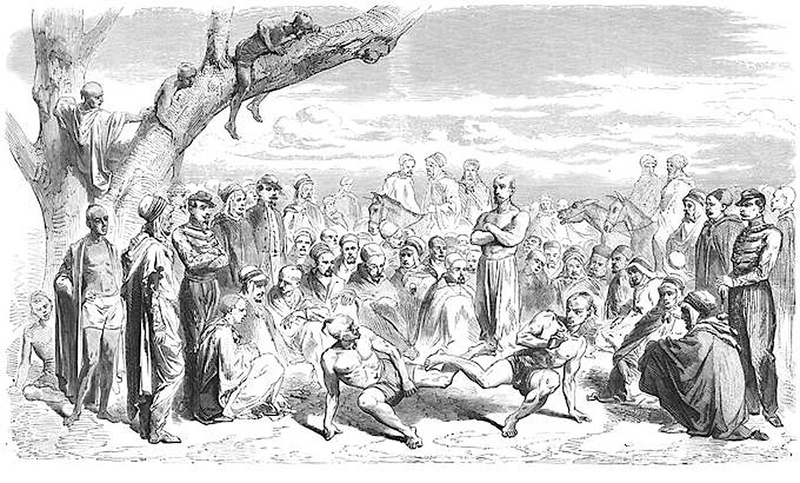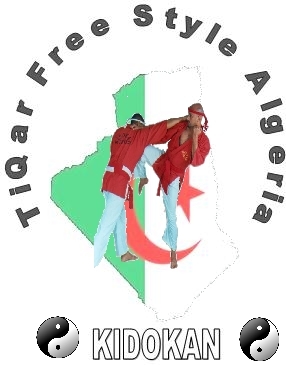
Tiqqar (Algeria)
- Name of sport (game): Tiqqar, Thiqar
- Place of practice (continent, state, nation):
Algeria, Kabylie, especially in Tizi Ouzou.
- History:
There was a fighting tradition in Kabylia called Tiqqar ("ruade" in Berber), which meant "hard".
It was a fight in which the young people of Kabylie tested their strength and pain resistance by fighting with their feet. The winner was considered the strongest man in the village and he always had to give a chance to pay back at the behest of the defeated, or else would be ridiculed by all the villagers. These fights were a kind of apprenticeship in the fight for the young.
This tradition was still very much alive until the Liberation War in the 1960s, but it began to fade over time. The competition was attended by all the young men of the village, often near the tajmâa (rural meeting place), and was the subject of competition between them individually, as a team, or even between villages. They only used their feet to attack; opponents fight until one of them is defeated, then shout "tuffelt" to end the fight. Each village had its own champions, and often such competitions were held. Tikar ceremony performed for General Nesmes-Desmarets by the Beni Mellikech - La tribu des Ath Mellikech lors d’une partie de Tiqqar, magazine L’illustration, 1857, numéro 769.Source: https://www.oldbookillustrations.com/illustrations/tikar-in-kabylia/
Tikar ceremony performed for General Nesmes-Desmarets by the Beni Mellikech - La tribu des Ath Mellikech lors d’une partie de Tiqqar, magazine L’illustration, 1857, numéro 769.Source: https://www.oldbookillustrations.com/illustrations/tikar-in-kabylia/ - Description:
The opponents agree on the number of players, individually or in teams (1 against 2 or 3 etc.). It may happen that the player himself determines the number of opponents he wants to fight. However, after making a choice, he cannot question it and, in case of failure, takes responsibility for his decisions.
The winner must always accept the challenge of the rematch at the loser's request, even after a very long time, or otherwise be ridiculed.
Rules:
- Competitors only use feet (not knees or hands).
- Attacks are performed while players are face to face, it is forbidden to attack from behind by surprise).
- It is forbidden to attack the head or below the waist.
- The hands may only be used to hold a support (stick, bench, wall etc.)
- In some forms, players may use all available space. In other forms, a circle is drawn within which competitors may not cross, under pain of being eliminated from the competition.
- Players can lock one foot by hitting the other one.Kick techniques:
- kicks with the whole foot,
- heel kicks
- Jumping kicks
- backward heel kicks
- kicks while lying on the stomach.
A fighter's effectiveness depends largely on his strategy. Competitors can look for a fulcrum on a tree, branch or on the opponent himself; The strategy may be to prevent the opponent from finding a fulcrum or finding a fulcrum so as to reduce the opponent's attack field. The players wear a gandour (a kind of light woolen or cotton tunic, with or without sleeves), which allows the blows to be cushioned. However, when clothing interferes with delivering blows, players sometimes hold the fabric with their teeth.
The competition may be stopped at the request of one of the competitors; when either of them is tired, they may ask for a rest and then resume the competition. A contestant may be disqualified when he abuses the allowed stop time or when he is out of range (for example, out of the circle, etc.), when he uses his hand to attack and when he returns to the fight without warning the opponent.
While tiqqar is a great exercise for young people, it can also be a brutal fight when practiced by adult, strong men. - Current status:
Today, this martial art has been somewhat forgotten in Kabylia, but on the initiative of enthusiasts, it is still continued in several countries in a modern form, called Kidokan. Reformed and developed by the master and expert Dr. Mohamed Hamed (died August 7, 2014), the sport is now practiced in 45 countries under the aegis of la Fédération Internationale de Kidokan (IKF).
- Contacts:
Fédération Internationale de Kidokan (IKF)
https://artsmartiaux.page.tl/
E-mail:This email address is being protected from spambots. You need JavaScript enabled to view it. Algéria Kidokan Association
https://www.facebook.com/Alg%C3%A9ria-kidokan-contact-association-553232578169504/
- Sources of information :
Source of photos used in this article:: https://www.oldbookillustrations.com/illustrations/tikar-in-kabylia/
- Gallery:

